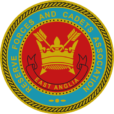Reserves Day is an annual opportunity for Reservists to show pride in their service, and for the whole of the UK to recognise and celebrate the valuable contribution Reservists make to our Armed Forces.
 The team have never before seen their boss in his military uniform; they know he is a Reservist but it’s not really been talked about until now. Everyone gathers to #SaluteOurForces for Reserves Day and find out more about what it’s like to be in the Reserve Forces.
The team have never before seen their boss in his military uniform; they know he is a Reservist but it’s not really been talked about until now. Everyone gathers to #SaluteOurForces for Reserves Day and find out more about what it’s like to be in the Reserve Forces.
Dr Cees Bennett runs Vets4Pets in Peterborough and is also a Reservist.
Cees (pronounced ‘Case’) was an Officer in the the Royal Army Veterinary Corps, joining straight after university. He left the Armed Forces 6 years ago with the ambition of setting up his own practice.
Cees admitted that he missed the camaraderie, the sense of purpose, and the feeling of being part of a team. He joined the Reserve Forces 101 Military Working Dog Squadron this year and now he feels like he’s part of the Armed Forces again; his squadron is well integrated with the regular squadrons in the Regiment, and they have the same great equipment as their full-time colleagues.


The dogs are trained in Protection & Search; some are trained to search for explosives, some can find people, drugs, even weapons. The handlers and their working dogs form a uniquely strong and close relationship. Veterinary Officers and Veterinary Nurses also regularly deploy on overseas training exercises and on operations, where they are tasked to maintain the health of the Military Working Dog fleet.
A job in the Reserve Forces enhances skills that are transferable to the workplace.
Dr Cees Bennett BVetMed MRCVS enables others to benefit from the training he knows will enhance their self-confidence and personal abilities. Some of his work as a reservist is a refreshing change from his day job. The Reserve Forces undergo rigorous training, which develops key skills such as leadership, teamwork and organisation. Undergoing training and serving on duty also develop resourcefulness, perseverance and the ability to improvise in unfamiliar or difficult circumstances. These are all highly-prized attributes in the workplace.
As a small business owner, would the business struggle to cope if he was mobilised?
Organisations like the Federation of Small Businesses have in the past expressed concerns about this. But Cees knows that the Ministry of Defence has measures in place to support businesses when Reservist employees are mobilised. He knows that there is financial assistance available. He knows that there are people he can speak with to obtain advice. He knows that sufficient notice is given to make arrangements. He knows that he can coordinate his mobilisation with his unit to minimise the impact on the business.
His business benefits from his affiliation with the Armed Forces.
To Cees, it demonstrates the high regard the general public holds for the Armed Forces. He finds he has many veterans, soldiers or their families as clients, because they know that he will apply the highest standards in caring for and treating their animals. The additional experience and specialist training handling working animals also benefits the business.
The reservists he trains with aren’t vets or veterans
The majority of Reservists in the unit will be trained as dog handlers, with no specialist skills required upon joining. No previous military experience is necessary either and there are only a few pre-requisites to join the Working Dog unit; liking dogs is the main one! Feeling ready to develop self-confidence and personal abilities is another.
The Reserve Forces make up approximately 1/7th of the UK’s Armed Forces personnel.*
It’s so important to increase public awareness and understanding of the role of the Reserve Forces in the Armed Forces today, and the contribution Reservists make to Defence and to the workforce.
Flying the flag on Reserves Day, wearing a uniform to work, holding a lunchtime talk to learn about the Reserve Forces. These are all ways to #SaluteOurForces on #ReservesDay.


